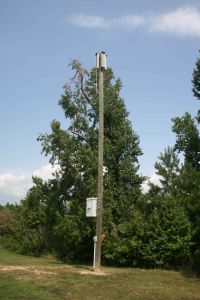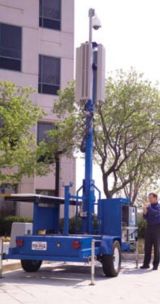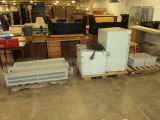Clear Warning: Difference between revisions
m (Airinpringles moved page Tyco Clear Warning to Clear Warning over redirect) |
No edit summary |
||
| Line 1: | Line 1: | ||
{{Infobox siren|title=Clear Warning|company=Johnson Controls (formerly) | {{Infobox siren|title=Clear Warning|company=<div>Johnson Controls (formerly) | ||
Tyco Integrated Security (????-2016) | <div>Tyco Integrated Security (????-2016) | ||
<div>The ADT Corporation (2006-????)</div>|produced=2006- | <div>The ADT Corporation (2006-????)</div>|produced=2006-present|type=[[Directional]] [[Electronic]]|image=Tyco_Clear_Warning.jpg|caption=A Clear Warning in Fort Eustis, VA. It is inactive.}}The '''Clear Warning''', also erroneously known as the ''Clear Voice'', is an electronic siren which was produced by Tyco Integrated Security, and formerly distributed by ADT.<ref>[https://www.tycois.com/insights-and-opinions/videos/clear-warning-system Tyco Integrated Security's Clear Warning System]</ref> The Clear Warning is unique in that it uses planar speaker arrays, leading to the siren delivering clearer voice messages then many of its competitors, solving a common problem that many other electronic sirens have. While uncommon, they are popular with college campuses and military bases, and serve the areas they are installed relatively well, although the number of active units are dwindling. | ||
== History | == History == | ||
The Clear Warning was first introduced after the White House issued an executive order requiring all government agencies, private and public institutions, and emergency responders charged with public safety to adopt "public alert and warning protocols and systems to secure delivery of coordinated messages to the American people." in 2006. Under a partnership with The ADT Corporation, Tyco introduced the Clear Warning later that year, an | The Clear Warning was first introduced after the White House issued an executive order requiring all government agencies, private and public institutions, and emergency responders charged with public safety to adopt "public alert and warning protocols and systems to secure delivery of coordinated messages to the American people." in 2006. Under a partnership with The ADT Corporation, Tyco introduced the Clear Warning later that year. Sometime around 2011 or 2012, after ADT debuted as an independent company, they ended production of the Clear Warning entirely, although the siren would still continue to be sold by Tyco. | ||
wip | |||
(wip | == Design == | ||
[[File:Clear Warning Official.jpeg|left|thumb|304x304px|A mobile Clear Warning.]] | |||
[[File:Clear Warning disassembled.png|thumb|160x160px|A Clear Warning unit disassembled on pallets.]] | |||
The Clear Warning is an electronic siren that utilized planar speaker arrays which serves the primary purpose of reducing the distortion and incoherency of voice messages, a problem shared by many traditional electronic sirens. Clear Warning units featuring a digital recorder player within the central processing unit, a 4-channel amplifier, DC power, and lightning and surge suppression. Units can be permanently mounted onto buildings or poles and can be deployed on self-contained mobile trailer units. Solar and generator power options were also available and were also capable of working in tandem with video surveillance cameras and text signage. The Clear Warning is operated by a Central Control Unit (CCU), which utilizes a PC-based GUI capable of displaying customized maps, the status of all units, and activating messages for individual or all Clear Warning units. The CCU can also schedule unattended playback of recorded messages and live broadcast. The CCU works by communicating with each unit via UHF, VHF, wide and narrow band frequencies, as well as wired fiber optic and wireless broadband connections. The RSS units are essentially self-powered "sound systems", featuring a digital recorder player within the central processing unit, a 4-channel amplifier, DC power, and lightning and surge suppression. RSS units can be permanently mounted onto buildings or poles and could be deployed on self-contained mobile trailer units. The Clear Warning can also be solar powered, installed with a generator or video surveillance cameras. Clear Warning units can be integrated with text signage and radio alerts. | |||
wip | |||
== References == | == References == | ||
Latest revision as of 16:37, 25 December 2024
| Clear Warning | |
 A Clear Warning in Fort Eustis, VA. It is inactive. | |
| Company | Johnson Controls (formerly)
Tyco Integrated Security (????-2016)
The ADT Corporation (2006-????)
|
|---|---|
| Produced | 2006-present |
| Type | Directional Electronic |
The Clear Warning, also erroneously known as the Clear Voice, is an electronic siren which was produced by Tyco Integrated Security, and formerly distributed by ADT.[1] The Clear Warning is unique in that it uses planar speaker arrays, leading to the siren delivering clearer voice messages then many of its competitors, solving a common problem that many other electronic sirens have. While uncommon, they are popular with college campuses and military bases, and serve the areas they are installed relatively well, although the number of active units are dwindling.
History
The Clear Warning was first introduced after the White House issued an executive order requiring all government agencies, private and public institutions, and emergency responders charged with public safety to adopt "public alert and warning protocols and systems to secure delivery of coordinated messages to the American people." in 2006. Under a partnership with The ADT Corporation, Tyco introduced the Clear Warning later that year. Sometime around 2011 or 2012, after ADT debuted as an independent company, they ended production of the Clear Warning entirely, although the siren would still continue to be sold by Tyco.
wip
Design


The Clear Warning is an electronic siren that utilized planar speaker arrays which serves the primary purpose of reducing the distortion and incoherency of voice messages, a problem shared by many traditional electronic sirens. Clear Warning units featuring a digital recorder player within the central processing unit, a 4-channel amplifier, DC power, and lightning and surge suppression. Units can be permanently mounted onto buildings or poles and can be deployed on self-contained mobile trailer units. Solar and generator power options were also available and were also capable of working in tandem with video surveillance cameras and text signage. The Clear Warning is operated by a Central Control Unit (CCU), which utilizes a PC-based GUI capable of displaying customized maps, the status of all units, and activating messages for individual or all Clear Warning units. The CCU can also schedule unattended playback of recorded messages and live broadcast. The CCU works by communicating with each unit via UHF, VHF, wide and narrow band frequencies, as well as wired fiber optic and wireless broadband connections. The RSS units are essentially self-powered "sound systems", featuring a digital recorder player within the central processing unit, a 4-channel amplifier, DC power, and lightning and surge suppression. RSS units can be permanently mounted onto buildings or poles and could be deployed on self-contained mobile trailer units. The Clear Warning can also be solar powered, installed with a generator or video surveillance cameras. Clear Warning units can be integrated with text signage and radio alerts.
wip